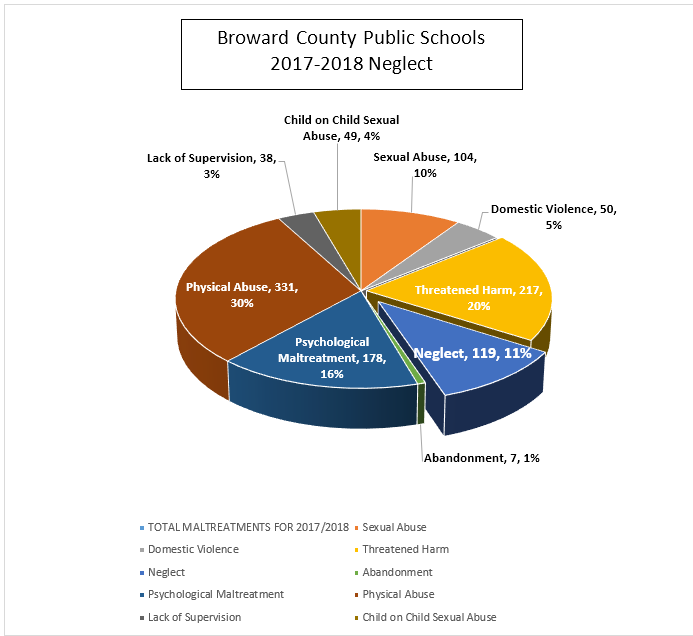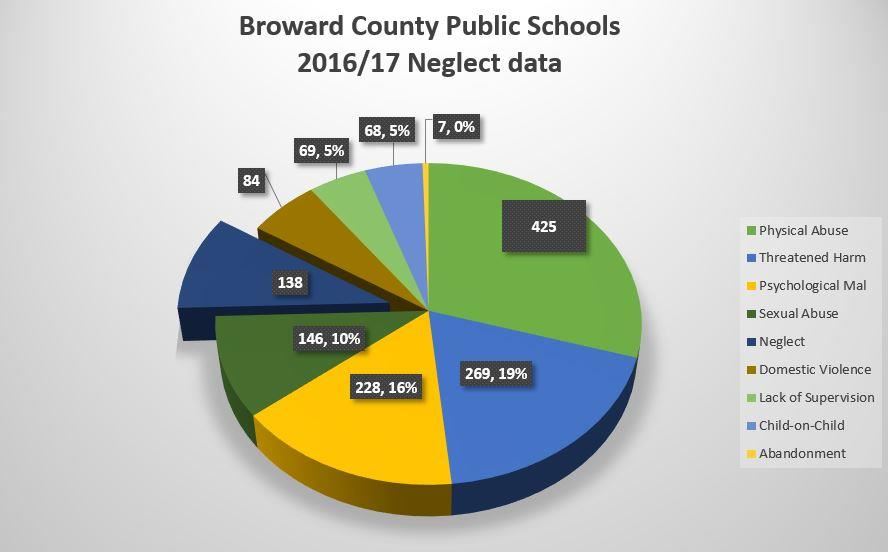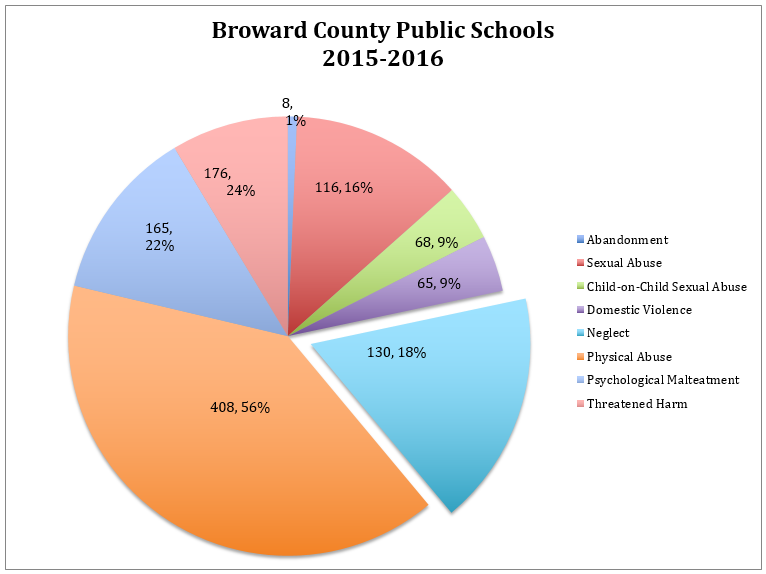Neglect

Neglect
-
Definition
As stated in Florida Statute 39, “neglect” occurs when a child is deprived of, or is allowed to be deprived of, necessary food, clothing, shelter or medical treatment or a child is permitted to live in an environment when such deprivation or environment causes the child’s physical, mental, or emotional health to be significantly impaired or to be in danger of being significantly impaired. The foregoing circumstances shall not be considered neglect if caused primarily by financial inability unless actual services for relief have been offered to and rejected by such person. A parent or legal custodian legitimately practicing religious beliefs in accordance with a recognized church or religious organization who thereby does not provide specific medical treatment for a child shall not, for that reason alone, be considered a negligent parent or legal custodian; however, such an exception does not preclude a court from ordering the following services to be provided, when the health of the child so requires:
- Medical services from a licensed physician, dentist, optometrist, podiatric physician, or other qualified health care provider; or
- Treatment by a duly accredited practitioner who relies solely on spiritual means for healing in accordance with the tenets and practices of a well-recognized church or religious organization.
Neglect of a child includes acts or omissions
As stated in Florida Statute 827 (criminal law), “Neglect of a child” means:
- A caregiver’s failure or omission to provide a child with the care, supervision, and services necessary to maintain the child’s physical and mental health, including, but not limited to, food, nutrition, clothing, shelter, supervision, medicine, and medical services that a prudent person would consider essential for the well-being of the child; or
- A caregiver’s failure to make a reasonable effort to protect a child from abuse, neglect, or exploitation by another person.
Neglect of a child may be based on repeated conduct or on a single incident or omission that results in, or could reasonably be expected to result in, serious physical injury or mental injury, or a substantial risk of death, to a child.
While frequent school absence or tardiness is a possible behavioral indicator of neglect, please note that there is no educational neglect in Florida law. Florida is a compulsory attendance state for children between the ages of six and sixteen years. The Florida abuse hotline will not accept reports based on lack of school attendance unless there is also suspected abuse or neglect as defined in Florida Statute 39. The school district has the responsibility to address attendance problems.
-
Indicators
Neglect is usually chronic in nature and reflects a caregiver’s failure to provide for the emotional and physical growth of the child. This failure may be due to stress, depression, personality disorders, and/or alcohol or other substance abuse by the parent. Neglectful parents are often not responsive to requests for action on behalf of their child, and school personnel can often cite a long history of failure of the parents to meet the child’s needs. The child’s parents may seem apathetic, expressing feelings of futility and hopelessness. Physical indicators of neglect may include:
- Torn, dirty clothing or clothing that is unsuitable for the weather
- Untreated injuries, illnesses, ailments, or psychological conditions
- Repeated incidence of head lice, despite multiple interventions to resolve
- Consistent hunger
Behavioral indicators of neglect may include:
- Child who begs for or steals food, or is deprived of food
- Child who states that there is no caregiver at home
- Consistent lack of supervision, especially in dangerous activities or for long periods
- Child who has been harmed in the past from being left alone
- Frequent school absence or tardiness
- Constant fatigue, listlessness, or falling asleep at school
- School dropout (adolescents)
- Early emancipation from family (adolescents)
- Abandonment by parent/caregiver.
These indicators have been reported in neglected children. However, most indicators, when considered alone, are not diagnostic of abuse. These indicators are a compilation from case examples in Broward County, the Child Abuse Source Book and from Cynthia Crosson Tower: Child Abuse and Neglect: A Teacher’s Handbook for Detection, reporting, and Classroom Management, 1984. One of the common errors in judgment that occurs regarding neglect is that educators tend to apply typical middle class standards to determine whether they think children are receiving proper care. For example, if a child isn’t clothed as well as the educator would clothe his/her own children, the educator often thinks that the child is neglected. In reality, it may be that the family is poor. Poverty and neglect are NOT the same. Florida Statute 39 states that “Neglect occurs when a child is deprived of, or is allowed to be deprived of, necessary food, clothing, shelter, or medical treatment or a child is permitted to live in an environment when such deprivation or environment causes the child’s physical, mental, or emotional health to be significantly impaired or to be in danger of being significantly impaired. The foregoing circumstances shall not be considered neglect if caused primarily by financial inability unless actual services for relief have been offered to and rejected by such person.” Using the same reasoning, it’s easy to see that a family that is homeless is not necessarily neglectful. Again, the underlying problem may be financial need or poverty. If parents or other caregivers have income, but choose to use the income to support alcohol, gambling or substance abuse, then the resulting failure to meet the children’s basic needs may be considered as neglect.
-
Data
In the 2017-2018 school year, 11 percent of the reports made by Broward County Public Schools employees involved suspected neglect.



-
Resources
The first resource for suspected neglect is use of self. As discussed on the data page, school personnel should first determine whether the parent is financially able to meet the child’s basic needs. When financial considerations are present, referral to free services is sometimes possible. Also, many programs and services have sliding scale fees, and may be feasible for parents to use at a lower cost.
For medical concerns, schools that have a health clinic may consult with the nurse. Other schools have access to a school nurse through the Broward County Health Department. Some schools have a partnership with a hospital district or other health provider. Consult with these medical personnel about referral for needed services.
Student support personnel at school will assist with referral to appropriate resources for families with financial need. They may:
- Assist families to obtain food from a food bank
- Refer the family for food stamps, Medicaid, SSI, and other governmental programs
- Help the family obtain clothing from the district clothing bank
- Refer to programs that provide shoes, eyeglasses, dental needs, orthopedic needs
- Refer to mental health or substance abuse programs.
When financial need does not seem to be present, and basic needs are not met, suspected neglect is reported to the Florida abuse hotline: 1-800-96-ABUSE.
Child protective investigators have special resources, such as referral for subsidized child care, to assist families with risk factors for neglect. They also may refer families to a program operated by Henderson Mental Health Center and co-located with the BSO Child Protective Investigations Section. This program will engage families in a helping relationship and follow-up to be sure that resources are accessed.
-
TO REPORT CHILD ABUSE, CALL 1-800-96ABUSE

